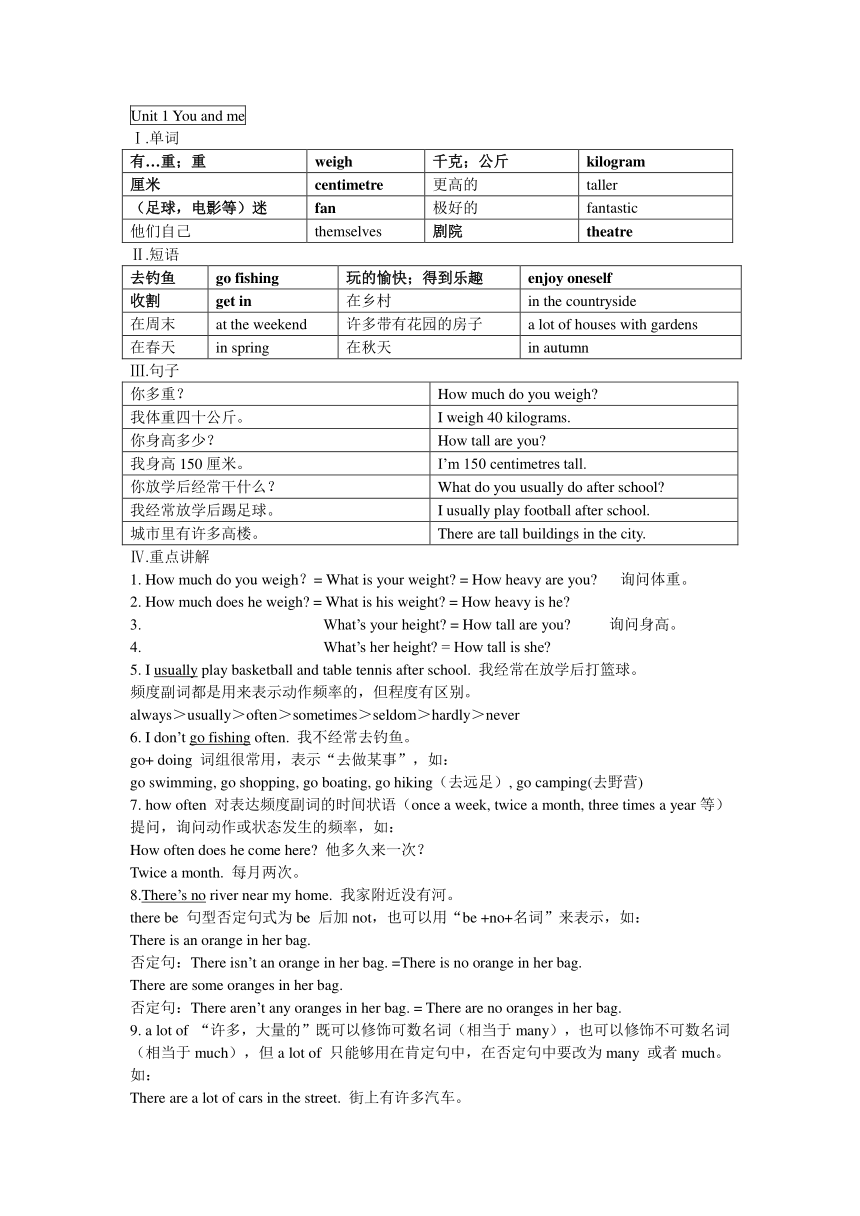Unit 1 You and me 学案
文档属性
| 名称 | Unit 1 You and me 学案 |

|
|
| 格式 | doc | ||
| 文件大小 | 212.0KB | ||
| 资源类型 | 教案 | ||
| 版本资源 | 牛津沪教版 | ||
| 科目 | 英语 | ||
| 更新时间 | 2018-08-02 00:00:00 | ||
图片预览

文档简介
Unit 1 You and me
Ⅰ.单词
有…重;重
weigh
千克;公斤
kilogram
厘米
centimetre
更高的
taller
(足球,电影等)迷
fan
极好的
fantastic
他们自己
themselves
剧院
theatre
Ⅱ.短语
去钓鱼
go fishing
玩的愉快;得到乐趣
enjoy oneself
收割
get in
在乡村
in the countryside
在周末
at the weekend
许多带有花园的房子
a lot of houses with gardens
在春天
in spring
在秋天
in autumn
Ⅲ.句子
你多重?
How much do you weigh?
我体重四十公斤。
I weigh 40 kilograms.
你身高多少?
How tall are you?
我身高150厘米。
I’m 150 centimetres tall.
你放学后经常干什么?
What do you usually do after school?
我经常放学后踢足球。
I usually play football after school.
城市里有许多高楼。
There are tall buildings in the city.
Ⅳ.重点讲解
1. How much do you weigh?= What is your weight? = How heavy are you? 询问体重。
2. How much does he weigh? = What is his weight? = How heavy is he?
3. What’s your height? = How tall are you? 询问身高。
4. What’s her height? = How tall is she?
5. I usually play basketball and table tennis after school. 我经常在放学后打篮球。
频度副词都是用来表示动作频率的,但程度有区别。
always>usually>often>sometimes>seldom>hardly>never
6. I don’t go fishing often. 我不经常去钓鱼。
go+ doing 词组很常用,表示“去做某事”,如:
go swimming, go shopping, go boating, go hiking(去远足), go camping(去野营)
7. how often 对表达频度副词的时间状语(once a week, twice a month, three times a year等)提问,询问动作或状态发生的频率,如:
How often does he come here? 他多久来一次?
Twice a month. 每月两次。
8.There’s no river near my home. 我家附近没有河。
there be 句型否定句式为be 后加not,也可以用“be +no+名词”来表示,如:
There is an orange in her bag.
否定句:There isn’t an orange in her bag. =There is no orange in her bag.
There are some oranges in her bag.
否定句:There aren’t any oranges in her bag. = There are no oranges in her bag.
9. a lot of “许多,大量的”既可以修饰可数名词(相当于many),也可以修饰不可数名词(相当于much),但a lot of 只能够用在肯定句中,在否定句中要改为many 或者much。如:
There are a lot of cars in the street. 街上有许多汽车。
There aren’t many cars in the countryside. 农村没有很多汽车。
Peter doesn’t have much homework on Wednesday. 彼得周三没有很多作业。
10. People here like to walk or ride their bikes. 这里的人喜欢步行或骑车。
like doing 长时间喜欢做某事,指兴趣爱好;
like to do 指某个具体动作,表示偶尔一次喜欢做某事或突然喜欢干某事,如:
She likes swimming. 她喜欢游泳。(经常性的,爱好)
She likes to swim this afternoon. 她今天下午想游泳。(特指某一次的动作)
11.七大洲:
亚洲---Asia [‘e???]
欧洲---Europe [‘j??r?p]
非洲---Africa ['?fr?k?]
北美洲--- North America [n?:θ ?'mer?k?]
南美洲--- South America [sa?θ ?'mer?k?]
大洋洲---Oceania [??si’ɑ:ni?]
南极洲—Antarctica [?n'tɑ:kt?k?]
音标:
[e?]
a
baby
favour ate
a-e
grade
space
ai
tail
paint
ay
May
stay
eigh
eight
weight
[a?]
i
pilot
tiger
i-e
line
white
y
fly
sky
igh
light
right
ie
die
lie
Ⅰ.单词
有…重;重
weigh
千克;公斤
kilogram
厘米
centimetre
更高的
taller
(足球,电影等)迷
fan
极好的
fantastic
他们自己
themselves
剧院
theatre
Ⅱ.短语
去钓鱼
go fishing
玩的愉快;得到乐趣
enjoy oneself
收割
get in
在乡村
in the countryside
在周末
at the weekend
许多带有花园的房子
a lot of houses with gardens
在春天
in spring
在秋天
in autumn
Ⅲ.句子
你多重?
How much do you weigh?
我体重四十公斤。
I weigh 40 kilograms.
你身高多少?
How tall are you?
我身高150厘米。
I’m 150 centimetres tall.
你放学后经常干什么?
What do you usually do after school?
我经常放学后踢足球。
I usually play football after school.
城市里有许多高楼。
There are tall buildings in the city.
Ⅳ.重点讲解
1. How much do you weigh?= What is your weight? = How heavy are you? 询问体重。
2. How much does he weigh? = What is his weight? = How heavy is he?
3. What’s your height? = How tall are you? 询问身高。
4. What’s her height? = How tall is she?
5. I usually play basketball and table tennis after school. 我经常在放学后打篮球。
频度副词都是用来表示动作频率的,但程度有区别。
always>usually>often>sometimes>seldom>hardly>never
6. I don’t go fishing often. 我不经常去钓鱼。
go+ doing 词组很常用,表示“去做某事”,如:
go swimming, go shopping, go boating, go hiking(去远足), go camping(去野营)
7. how often 对表达频度副词的时间状语(once a week, twice a month, three times a year等)提问,询问动作或状态发生的频率,如:
How often does he come here? 他多久来一次?
Twice a month. 每月两次。
8.There’s no river near my home. 我家附近没有河。
there be 句型否定句式为be 后加not,也可以用“be +no+名词”来表示,如:
There is an orange in her bag.
否定句:There isn’t an orange in her bag. =There is no orange in her bag.
There are some oranges in her bag.
否定句:There aren’t any oranges in her bag. = There are no oranges in her bag.
9. a lot of “许多,大量的”既可以修饰可数名词(相当于many),也可以修饰不可数名词(相当于much),但a lot of 只能够用在肯定句中,在否定句中要改为many 或者much。如:
There are a lot of cars in the street. 街上有许多汽车。
There aren’t many cars in the countryside. 农村没有很多汽车。
Peter doesn’t have much homework on Wednesday. 彼得周三没有很多作业。
10. People here like to walk or ride their bikes. 这里的人喜欢步行或骑车。
like doing 长时间喜欢做某事,指兴趣爱好;
like to do 指某个具体动作,表示偶尔一次喜欢做某事或突然喜欢干某事,如:
She likes swimming. 她喜欢游泳。(经常性的,爱好)
She likes to swim this afternoon. 她今天下午想游泳。(特指某一次的动作)
11.七大洲:
亚洲---Asia [‘e???]
欧洲---Europe [‘j??r?p]
非洲---Africa ['?fr?k?]
北美洲--- North America [n?:θ ?'mer?k?]
南美洲--- South America [sa?θ ?'mer?k?]
大洋洲---Oceania [??si’ɑ:ni?]
南极洲—Antarctica [?n'tɑ:kt?k?]
音标:
[e?]
a
baby
favour ate
a-e
grade
space
ai
tail
paint
ay
May
stay
eigh
eight
weight
[a?]
i
pilot
tiger
i-e
line
white
y
fly
sky
igh
light
right
ie
die
lie
同课章节目录
- Module 1 Changes and differences
- Unit 1 You and me
- Unit 2 Changes in our lives
- Unit 3 Our school in the future
- Module 2 Work and play
- Unit 4 Art
- Unit 5 Crafts
- Unit 6 PE lessons
- Module 3 Things we do
- Unit 7 Helping others
- Unit 8 Reading signs
- Unit 9 Reusing things
- Module 4 Things we enjoy
- Unit 10 Great storybooks
- Unit 11 Western festivals
- Uint 12 The five peas
